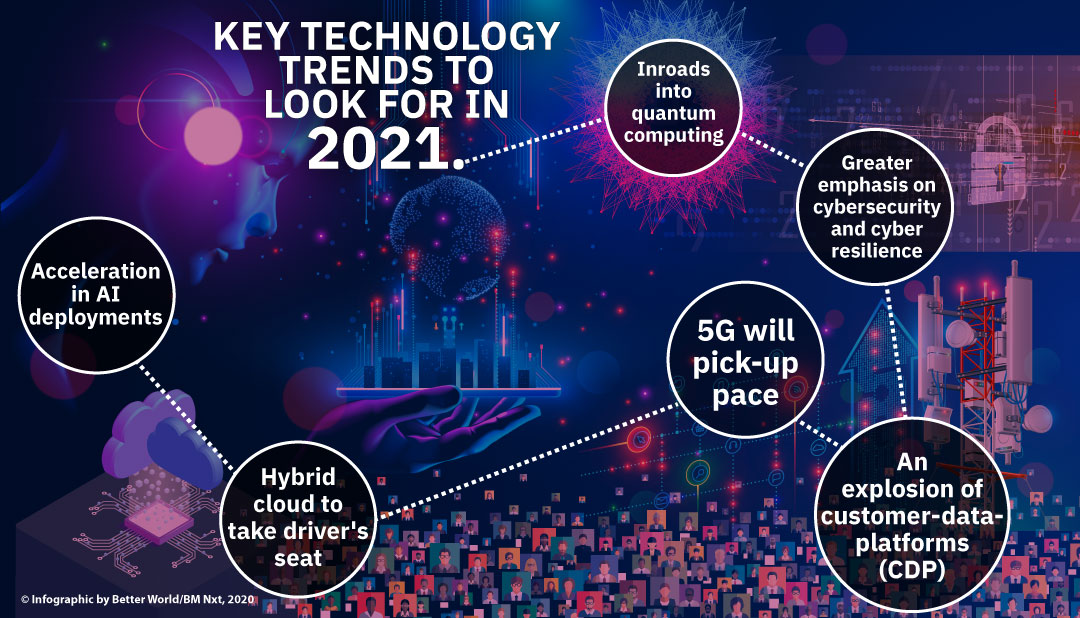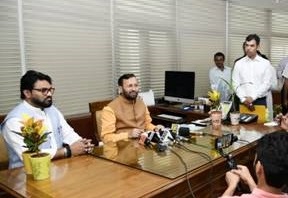Not only has 2020 been one of the most challenging years in the history of humanity, but it has also completely transformed our way of thinking and working. Many of the top technology trends help us navigate the crisis.
Throughout the year, COVID-19 has hurt all areas of life, causing businesses to close, economies collapse, and people to be anxious. Amid panic and uncertainty, technology and connectivity have become vital elements that have given people and companies hope, courage, optimism, and the competence to continue. (See: Technology trends for businesses in 2020)
The year was marked by many technological trends surrounding the cloud, robotics, the Internet of Things (IoT), and augmented reality (AR), leading companies through the crisis. As the year concludes, organizations in all sectors have realized the importance of a scalable and secure network, superior connectivity, and advanced analytical tools to enable their people to meet new challenges while working from anywhere.
For technology leaders, this new approach has led to the accelerated execution of digital transformation efforts, the review of their IT budgets, and the redesign of their future business continuity frameworks.
At Better World, we expect businesses to continue focusing on cutting-edge technologies in 2021 and upgrade their networks to equip themselves to deal with any future barriers fully.
Let’s look at some of the top technology trends that will be key to delivering business transformation in 2021.
5G adoption to take off in 2021
One of the most anticipated wireless technologies of the modern era, the fifth-generation technology standard for broadband cellular networks, is likely to pick up pace in 2021. The technology would match or even exceed the speeds of physical, optical fiber connections under most conditions, strengthening many it-based deployments soon.
5G has already been introduced in many countries by select telecommunications companies in limited locations. It is likely to be available for approximately 15% of the world’s population by the end of 2020. By 2021, there will be more dynamic deployments and expansions worldwide, making them available for at least 70% of the global population.
For successful 5G rollouts, telecom operators will focus on robust network planning and monitoring tools to offer new monetization opportunities and control operating costs.
In India, Reliance Jio has been working closely with numerous national equipment makers to lead the 5G race. The telecom operator has put aside the ambitious 5G rollout schedule for the second half of 2021, depending on spectrum availability. Once available, the technology will bring more incredible automation benefits to the manufacturing and logistics process. It will enable enterprises to control mission-critical devices remotely in real-time and drive innovative customer experience.
The explosion of customer-data-platforms (CDP)
The COP ranks second among the major technology trends for 2021. While the pandemic put most businesses under enormous pressure in 2020, there has been high interest and investments around CDP. The CDP is a collection of software that retrieves dispersed data, let’s say, from a single client, from multiple sources in a single organized and central location.
Compared to conventional customer relationship management (CRM) systems, CDP allows companies to give their customers a consolidated view from broader contact points. It helps strengthen customer engagement by enabling organizations to track customer profiles through their lifecycle and interactions.
Technology majors such as Microsoft, Oracle, SAP, Salesforce, Treasure Data, and Adobe are investing heavily in CDP deployment. By 2021, businesses will see a more significant amount of data from data lakes and other sources. This will speed up the demand for automated tools and technologies that allow companies to intelligently analyze data, benefit customers, and generate new opportunities.
Hybrid cloud to occupy center stage
Although there are no crystal balls to precisely forecast enterprise cloud strategy, it is clear that hybrid cloud technologies will substantially grow in popularity among CIOs. In the post-pandemic era, organizations realized the importance of a modern hybrid multi-cloud architecture. They had to amplify their collaboration activities across their business functions in a work-from-home setup.
A greater realization came around managing IT resources through a combination of on-premise cloud computing services and third-party services to reduce the chances of network downtime, eliminate data silos, and help scale business with agility.
From 2021 and throughout the next few years, hybrid cloud is expected to be one of the top technology trends. Most young enterprises and organizations who plan to migrate to the cloud in 2021 will be looking to take the hybrid cloud route to exploit business opportunities and provide an exceptional consumer experience.
Acceleration in AI deployments
In 2021, organizations will rely heavily on artificial intelligence (AI) to improve resilience, rapid computer operations management, decision-making, maximizing resources, and improving supply chain efficiency. According to Better World, at least 70 percent of enterprises across all sectors have adopted some form of AI-based technologies this year. A majority of them will pledge aggressive AI-based production deployments during the next twelve months to establish a competitive edge.
Some of the leading examples in the AI-space are Chatbots, intelligent analytics, Robotic Process Automation (RPA), driverless vehicles, contactless technologies, digital assistants, and location finder apps (such as Google maps).
The next year will see several AI-based use case studies, which will also be driven by 5G rollouts. In a fast-growing virtual environment, technology leaders would require intelligent models to manage and use enormous data wisely. AI-led solutions will enable organizations to derive concrete insights and break down the data smartly with a tremendous speed. (See: Enterprises in India leading AI adoption globally)
Greater emphasis on cybersecurity and cyber resilience
While in 2020, enterprises were largely focused on adjusting to the crisis, 2021 will see the aggressive implementation of robust digital transformation initiatives that can expand businesses’ remote workforce capabilities and strengthen corporate resilience. This unparalleled workplace transition also requires businesses to build newer strategies to protect employees’ networks by augmenting their cybersecurity architectures.
In 2021, a significant focus on cybersecurity will be looking at IT security areas that are too expensive to implement. With the upcoming expansion of IoT connected devices, networks will be more vulnerable to large-scale multivector cyberattacks.
In the second half of 2021, organizations are expected to focus on cybersecurity and accelerate their deployment efforts around advanced solutions to protect their networks and clouds and improve security controls.
Technologies that could drive the adoption of secure cloud solutions will be much in demand. (See: How COVID-19 has changed cybersecurity focus for 2021).
Additionally, there will be a continued emphasis on remote monitoring capabilities, automation, and zero-trust models for robust user access patterns. (See: Top enterprise cybersecurity trends of 2020)
Inroads into quantum computing
Another top trend of 2021 will be a stronger focus on quantum computing. A lot of industry viewers believe that next year might be the year of quantum computing planning. Several algorithms will drive the quantum computing performance, and those will be seriously looking at making inroads into IT use case workflows.
Several vendors such as IBM, Google, Honeywell, and DWave have showcased their quantum solutions scale. While quantum computing still has a long way to go, in 2021, several use cases are expected to be deployed.








0 Comments